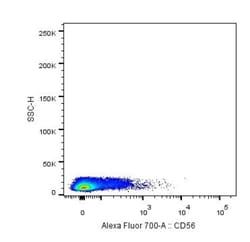NCAM-1/CD56 Antibody (123C3.D5), Alexa Fluor™ 700, Novus Biologicals™
Manufacturer: Novus Biologicals
Select a Size
| Pack Size | SKU | Availability | Price |
|---|---|---|---|
| Each of 1 | NBP233132Z-Each-of-1 | In Stock | ₹ 60,742.50 |
NBP233132Z - Each of 1
In Stock
Quantity
1
Base Price: ₹ 60,742.50
GST (18%): ₹ 10,933.65
Total Price: ₹ 71,676.15
Antigen
NCAM-1/CD56
Classification
Monoclonal
Conjugate
Alexa Fluor 700
Gene Alias
CD56, CD56 NCAM-1, CD56 antigen, MSK39, N-CAM-1, NCAM-1, NCAMantigen recognized by monoclonal 5.1H11, neural cell adhesion molecule 1, neural cell adhesion molecule, NCAM
Host Species
Mouse
Purification Method
Protein A or G purified
Regulatory Status
RUO
Primary or Secondary
Primary
Test Specificity
This monoclonal antibody reacts with an extracellular domain (close to transmembrane) of CD56/NCAM. Three isoforms of neural cell adhesion molecule (NCAM) are produced by differential splicing of the RNA transcript from a single gene. The 135kDa isoform is the basic molecule, which is glycosylated or sialylated to produce the mature species. Anti-CD56 recognizes two proteins of the neural cell adhesion molecule, the basic molecule expressed on most neuroectodermally derived tissues and neoplasms (e.g. retinoblastoma, medulloblastomas, astrocytomas, neuroblastomas, and small cell carcinomas). It is also expressed on some mesodermally derived tumors (rhabdomyosarcoma). Anti-CD56 plays an important role in the diagnosis of nodal and nasal NK/T-cell lymphomas.
Content And Storage
Store at 4C in the dark.
Isotype
IgG1 κ
Applications
Western Blot, Flow Cytometry, ELISA, Immunohistochemistry, Immunocytochemistry, Immunofluorescence, Immunohistochemistry (Paraffin), Immunohistochemistry (Frozen)
Clone
123C3.D5
Dilution
Western Blot 1:100-1:2000, Flow Cytometry 1:10-1:1000, ELISA 1-5 μg/mL for coating, Immunohistochemistry, Immunocytochemistry/Immunofluorescence 1:10-1:500, Immunohistochemistry-Paraffin 1:10-1:500, Immunohistochemistry-Frozen 1:10-1:500
Gene Symbols
NCAM1
Immunogen
Membrane preparation of a small cell lung carcinoma.
Quantity
0.1 mL
Research Discipline
Astrocyte Markers, Cellular Markers, Cytokine Research, Cytoskeleton Markers, Growth and Development, Hematopoietic Stem Cell Markers, Immunology, Innate Immunity, Membrane Vesicle Markers, Myeloid derived Suppressor Cell, Neuronal Cell Markers, Neuronal Stem Cell Markers, Neuroscience, Stem Cell Markers
Gene ID (Entrez)
4684
Target Species
Human, Rat, Zebrafish
Form
Purified
Description
- NCAM-1/CD56 Monoclonal specifically detects NCAM-1/CD56 in Human, Rat samples
- It is validated for Flow Cytometry, Immunohistochemistry, Immunocytochemistry/Immunofluorescence, Immunohistochemistry-Paraffin.

